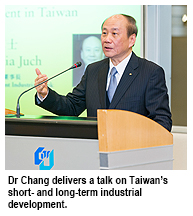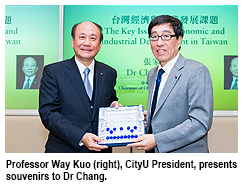Taiwan’s economic and industrial development
Taiwan’s short- and long-term industrial development was the topic for a talk by the Chairman of the China Development Industrial Bank at City University of Hong Kong (CityU) on 11 February.
Dr Chang Chia-juch delivered a talk titled “The Key Issues of Economic and Industrial Development in Taiwan” as part of City University Distinguished Lecture Series.
His lecture argued that a lack of investment over the past years in Taiwan was reflected in recent GDP figures.
For many years, Taiwan had heavily relied on export for economic growth, he said. More than 80% of its industrial products were for export, and most of Taiwan’s manufacturers engaged in component assembly or acted as OEM (Original Equipment Manufacturer).
But because Taiwan needs to import core technologies from overseas, it has become difficult to add value to its products. Therefore, to ensure its overall competitiveness in the export market, Dr Chang said Taiwan should study three industries and explore ways for their transformation.
First, Taiwan’s traditional industry sector must improve the quality and value of its products. There are currently 10 corporations engaged in the production of ordinary metallic fasteners, for example. If they changed to produce fasteners made of super alloys for the aviation manufacturing industry, the value of their products would increase by 15 times, Dr Chang argued.
Also, there were now about 600 corporations producing general metallic bolts, he said. If they transformed their products for use in aviation manufacturing industry, the value would rise by 45 times.
Secondly, Taiwan should develop a complete supply chain system for its core industry, the speaker said. Taking multiple thin films for flat panel monitors as an example, the supply of compensating film is constrained by the patented technology of major international manufacturers, while the locally produced TAC (triacetate cellulose) film and PVA (polyvinyl alcohol) film cannot meet local demand.
Dr Chang said Taiwan should improve the production of materials with critical functions and expedite the expansion of the supply chain system to increase the self-sufficiency rate to 70%. This could also help reduce the manufacturing cost for Taiwan’s products.
Thirdly, Taiwan should strengthen the development of its emerging industries, he said. For example, it could develop “smart campuses”. The recently launched smart classrooms that are equipped with a series of digital teaching materials, platform tools and learning kits are over 10 times more valuable than that of traditional classrooms.
Also, investment for the whole project—with smart building management, smart administrative management and information exchange platform for a smart campus—could reach NT$10 million, which is 10 times higher than that of traditional classrooms.
Dr Chang also suggested that Taiwan should actively take part in international trade. In order to strengthen its competitiveness in the export market, Taiwan should consider signing the Trans-Pacific Partnership Agreement and joining the Regional Comprehensive Economic Partnership to reduce tariffs.
Many countries have reservations about conducting business with Taiwan for fear of opposition from mainland China. To this, Dr Chang said, “We signed a free trade agreement with Singapore and New Zealand two years ago. We should not avoid the mainland, but we should approach the mainland via the world, rather than the other way round.”
Dr Chang graduated from Purdue University in the US with a PhD in Transportation and Urban Engineering. In the 1980s, Dr Chang was recruited as a Professor and Director of the Institute of Traffic and Transportation at Taiwan’s National Chiao Tung University and was later appointed as the Director General of the Institute of Transportation of the Ministry of Transportation and Communications, Taiwan.
He was responsible for the overall planning and development of transportation infrastructure in Taiwan, including the Taipei mass rapid transit system, and the freeway and highway system. In 2013, he was once again recruited by the Taiwan Government and was appointed as Minister of Economic Affairs. He is now Chairman of China Development Industrial Bank in Taiwan.

